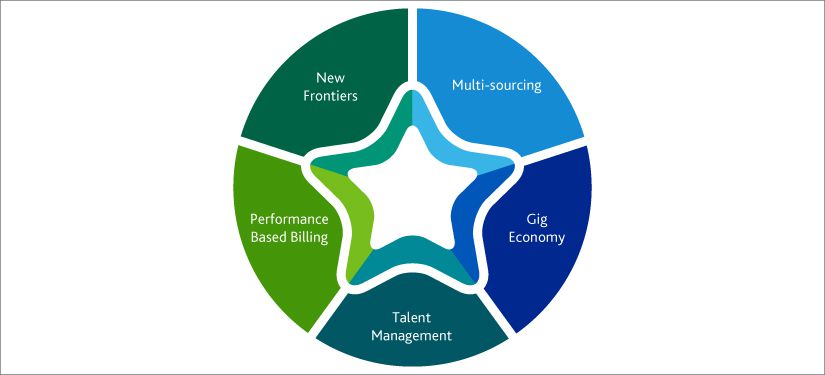Published on May 18, 2018 by Vaibhav Methi
The management consulting industry is undergoing a transitionary phase. Although it has witnessed encouraging growth figures recently, consulting firms would need to navigate some impending challenges to continue the upward trajectory. Key trends prevalent in the consulting world are explained below.
New frontiers: A consulting firm cannot keep charging high rates for what’s now seen as “commodity” consulting. The growth of firms and their ability to acquire new business will hinge on how they can provide tangible value addition in the twin opportunity areas of automation and new regulations.
Automation: Technological transformation is leading to new business models, disrupting company structures. Innovation and differentiation offered by consulting firms will be critical to framing new operational models for their clients. Skill sets such as Agile, AI (artificial intelligence), and analytics will be crucial in providing a digital and customized customer experience.
Legislation: Regulatory changes, influencing the industries consulting firms cater to, will require the firms to stay relevant and provide high-value advice. This would be best achieved by upgrading their skills and service delivery mechanisms to suit the new order. Existing commoditized practice areas will continue to shore up the lion’s share in the sector, but will command lower rates comparatively.
Multi-sourcing: Gone are the days when a large multipronged project would be awarded to a single consultant and consultancies would have all the capabilities in-house to deliver solutions to clients. By contrast, it is becoming increasingly difficult for a single firm to offer all services, given the transformation in various practice areas. Firms are, therefore, partnering with specialists to offer a whole spectrum of services. Concurrently, corporates are increasingly asking multiple firms to collaborate so that they receive expertise in every niche area of a single large project.
This has led to the emergence of disruptive models, of which the most notable is “crowdsourcing.” In this model, a network of freelancers and small firms come together online to provide solutions to a client.
Gig economy: Also known as “a la carte model” or the “uberization” of the consulting industry, by definition, it refers to the transactional and commoditized engagement between a client and a consulting firm. Clients choose the services they need and when they need and end the engagement on the completion of the project. Since it does not involve long-term relationships between a client and a consultant, talent development in consulting firms may be impacted, as firms will focus on short-term or project-based requirements.
Talent management: The performance of a consulting firm is directly correlated to the wealth of talent it possesses and can deploy in a particular engagement. Clients are selecting team members who will work on their engagement. While scouting for the best talent, firms are looking beyond the boundaries of universities and focusing on specific skill sets to bring onboard diverse candidates with unconventional and creative aptitudes.
There is an emerging trend where consulting firms are devising ways to sell services or products that are not dependent solely on the resources employed.
Performance-based billing: Clients are engaging with consultants to extract “value for money,” in the form of operational improvement or strategy formulation. Thus, consultants would do well if they “define” and “deliver” outcomes of an engagement and share the client’s risks and rewards. This would entail premium/higher pricing than the regular time and materials model of pricing.
In the period of transformation that lies ahead, consulting firms must recognize the need to embrace change, transitioning from time-honored business models to those that harness the power of digital technology. In addition, they should partner and collaborate with relevant stakeholders. This will enable them to not only deliver better outcomes to their clients, but also become a partner who their clients can trust to forge a long-term relationship through thick and thin.
Acuity Knowledge Partners can help consulting firms navigate these times by helping them in not only meeting their talent/skill requirements but also staying abreast of the latest technological and regulatory changes. Acuity Knowledge Partners has demonstrated this by partnering with some of the largest and best consulting firms globally in the path to continuous improvement.
Sources: consultancy.uk , infodesk.com, web articles
What's your view?
Comments
15-Sep-2020 01:23:41 am
Like the way we think?
Next time we post something new, we'll send it to your inbox







